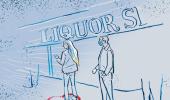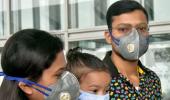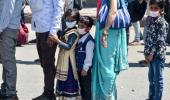'The theme of death seems to be a theme about which many of us, raised in Western societies, have almost completely removed from consciousness; it represents a theme that is suddenly and forcefully resurging now.'
'And for some, this is scary and destabilising.'

In the concluding segment of his interview with Sheela Bhatt, Professor Giuseppe Pantaleo, professor of social psychology at the faculty of psychology, Vita-Salute San Raffaele University, Milan, Italy, below, says, "This tragedy will surely impart new directions to society, in Italy, in Europe and, I guess, in the entire world."
How are the different classes viewing this pandemic -- as in, the poor, rich and working classes? How are people coping with stress and anxieties?
The virus basically makes no differences -- of any sort.
Recently, Prince Charles of England has been found positive to the coronavirus as unfortunately have also some other prominent figures here in Italy.
One of the latest news today, March 27, is also Boris Johnson resulting positive to the virus.
Of course, to the extent that certain levels of education are related to social census, less-educated people -- or, also, people experiencing a 'polarisation' of attitudes and emotions towards some forms of mental rigidity -- would fall much easier prey to certain conspiracy 'theories' (eg, 'the virus has been developed and spread on purpose for specific economic reasons, to put on their knees the strongest economies of the world', etc), if compared with more-educated people -- or, also, with people enjoying a broader repertoire of 'multiple psychological perspectives'.
It is likewise foreseeable that, in the long run, economically disadvantaged people will experience stronger difficulties both in their everyday ways of living and in terms of the financial resources needed to get along with the lockdown and the contrasting of the pandemic -- including comparatively more scanty possibilities of enacting social distancing and self-isolation properly.
Not to mention a comparatively lesser personal accessibility to economic resources, needed to readapt to social and working life in general, once the pandemic will be over.
Further, the way in which people cope with stress and anxiety can be readily understood through the lens of another influential social-psychological theory, the terror management theory (Greenbeerg, Solomon & Pyszczynski, 1986).
The model derived by the theory, named terror management health model (Goldenberg & Arndt, 2008), predicts that some 'proximal' (immediate) reactions to death threat will follow what we normally call a 'rational' behaviour: To the extent that people have the capacity and expect to succeed in enacting health-protective behaviours, they will be motivated to act accordingly.
This will often result in the enactment of proper, health-protective behaviours.
Conversely, when the awareness of death slips over the threshold of conscious thoughts -- while remaining still highly mentally accessible, however -- people will conform, quite uncritically, to group norms to preserve, or even enhance, their sense of self-worth, thus activating a so-called 'distal' (delayed) psychological defence.
This increased sense of self-worth (self-esteem) is attained through social identification with a social group or a broader social unit and, through the heightened feeling of belonging to a given social group (a group securing transcendence to the individual, and thereby a sense of symbolic immortality), lends to the individual a feeling of psychological protection vis-à-vis the terror originating by death threat (eg, the spreading of the pandemic).
So, it is exactly at this psychological junction that the behaviour of role models will become particularly influential. If role models (group leaders, opinion leaders, social influencers) act ‘wisely’, identifiers will, on the average, follow those virtuous behaviours.
If, by contrast, role models implement risky behaviours, identifiers will also follow them through the risky route.
It is evident, then, that in such a case the psychological need to belong to the group takes precedence over the more 'rational' enactment of health-protective behaviours.
This is then why we, as humans and group members, should be particularly cautious either in following or in giving examples -- everybody is, in principle, a role model for the others!
What is your take on the controversy that China is responsible for hiding the pandemic? What are Italians thinking about the virus that came from Wuhan?
Unlike did Mr Donald Trump in the US at the outset of the epidemic, fortunately we are not publicly thinking of the virus as the 'Chinese virus'.
It may be that the communication of what at the time was happening in China has been somehow delayed by the Chinese government -- but I am inclined to think that such a delay was more due to uncertainty about whether the virus was actually so dangerous and rapid in its spreading, than to a calculated plan.
 Right after that, in any case, China gave the best examples -- and also concrete help -- from which we all should learn, and actually are learning.
Right after that, in any case, China gave the best examples -- and also concrete help -- from which we all should learn, and actually are learning.
What are Italian people thinking about the origin of the virus? Again, the issue is controversial. But the vast majority do not see the virus as the 'Chinese virus', at least no longer.
What have been those few moving moments that shook Italy?
The most moving moments are those still indelibly tied to the many images, instantaneously and broadly spread through the social media, of doctors and patients in hospitals.
We could not believe that so many people were so rapidly dying.
Also, very touching were the images of the many military convoys transporting the (too many) corpses of the deceased, to some other places and towns because in the epicentres there were no longer cemeteries able to lay to rest their corpses. Awful.
Again, the theme of death and a 'death threat' seems to be a theme about which many of us, raised in Western societies, have almost completely removed from consciousness; it represents a theme that is suddenly and forcefully resurging now.
And for some, this is scary and destabilising.
Are people blaming the government for taking time to understand the crisis?
There have actually been composite and varied reactions, as usual. Some people blamed the government, others praised the government. Again, 'polarisation'!
In my view, the very bad and sad thing is that some politicians, and their political parties, are still quite overtly capitalising on this, for their own political interests -- they are overtly contrasting and attacking the government, far more than common people are actually doing. This is no good example, in my view.
And such irresponsible misbehaving capitalises, once again, on diffuse fears and judgement polarisation, on those very emotional extreme reactions that are quite easy to induce, especially in frightened individuals, and masses, who have mostly a relatively scanty background in multiple perspectives (the unprotected from tendentious political persuasion).
What are your other worries right now as Italy struggles to contain the spread of coronavirus?
My main worry relates, for now, to the far possibility of 'social collapse', a teasing and disruption of social bonds and social tissue, social hysteria, and social contagion.
But we have at our disposal social-psychological and communicative instruments to avoid all of this. We should simply be willing to use and implement those instruments.
In our modern societies we have all already been victims of a general 'infodemic' (an information overflow and a pandemic of fake news, according to the World Health Organisation).
For the moment, however, people in Italy are reacting quite virtuously, even if some coalitions (eg, those made through the social media) have initiated expressing, of course, a certain intolerance vis-à-vis the necessity to stay at home and drastically stop the vast majority of productive activities for a long period of time. But I trust my fellow citizens.
Will Italy ever be the same again?
This tragedy will surely impart new directions to society, in Italy, in Europe and, I guess, in the entire world.
The end result will depend, however, on whether the global, corporatised, and ever-present traditional market forces will blindly prevail again on the attempts at building a renewed civic sense, a sense based on the sharing of multiple perspectives, thus silencing and suppressing, once again, the formation of a renewed sense of 'Gemeinschaft' (community), rather than a mere sense of 'Gesellschaft' (society), as intended as far back as 1887 by the always current eminent German scholar Ferdinand Tönnies.
Thank you for asking these important questions.










